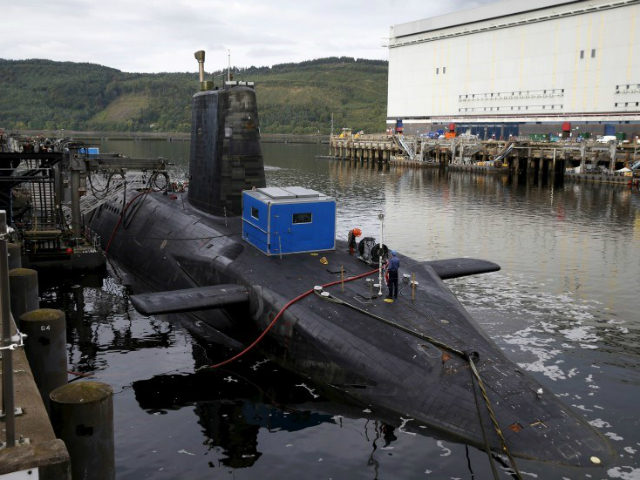LONDON (Reuters) – MPs voted strongly on Monday to renew Britain’s ageing nuclear weapons system, a multibillion-pound project regarded as key to maintaining the country’s status as a world power following its vote to leave the European Union.
Despite opposition from the pro-independence Scottish National Party (SNP) and some in the opposition Labour Party, parliament approved the renewal of the Scottish-based nuclear-armed Trident submarines by 472 to 117 votes.
Some opponents said the vote was being used by new Prime Minister Theresa May to unify her party, which has a parliamentary majority of 16, after a bruising Brexit campaign, and embarrass Labour by highlighting its own deep divisions.
In her first statement in parliament as prime minister, May urged lawmakers to back Trident, not only to protect Britain from growing threats from Russia and North Korea, but also to protect thousands of jobs in Scotland and elsewhere.
“What this country needs to do is to recognise that it faces a variety of threats and to ensure we have the capabilities that are necessary and appropriate to deal with each of those threats,” she said ahead of the vote.
Britain needed to retain a nuclear deterrent which had been an insurance policy for nearly 50 years, May said.
“We cannot outsource the grave responsibility we shoulder for keeping our people safe … That would be a reckless gamble: a gamble that would enfeeble our allies and embolden our enemies; a gamble with the safety and security of families in Britain that we must never be prepared to take.”
Parliament agreed in principle in 2007 to replace the deterrent system and Monday’s vote was to rubber stamp the decision to approve the building of four submarines to ensure Britain can have nuclear weapons continuously on patrol at sea.
UK’S “OUTSIZED” ROLE
U.S. Defence Secretary Ash Carter said in February Britain must renew the submarines, based at Faslane, if it wanted to maintain its “outsized” role in world affairs.
During more than five hours of debate in parliament, many argued that failing to renew the system would mark Britain retreating from the world.
However, Scottish nationalists and some in Labour believe the weapons are no longer needed as they are little use against terrorists and the money could be better spent elsewhere.
Labour leader Jeremy Corbyn, who has been challenged by two candidates seeking to take the helm of the centre-left party, questioned the need for Britain to possess “weapons of mass destruction” and said it should press for a nuclear-free world.
“I would not take a decision that kills millions of people, I do not believe the threat of mass murder is a legitimate way to go about dealing with international relations,” said Corbyn, who had indicated his lawmakers could vote freely on Trident.
Many Labour lawmakers criticised their leader’s view, which is in contrast with the party’s official position on Trident.
SNP Westminster leader Angus Robertson said the renewal was opposed by Scotland, where May’s Conservatives hold just one of the 59 seats in the British parliament.
“It is obscene that the priority of this government … is to spend billions of pounds on outdated nuclear weapons that we do not want, do not need and could never use,” he said during the debate.
“This government has a democratic deficit in Scotland and with today’s vote on Trident it is going to get worse not better.”
SELF-HARM
Some military officials also oppose the outlay on Trident, saying the money would be better spent on maintaining the army and on more conventional technology, both of which have recently suffered cutbacks.
The Ministry of Defence has said replacing the four submarines would cost 31 billion pounds ($41 billion), plus a contingency fund of 10 billion pounds, with another 4 billion already allocated to the design process.
Defence firms BAE Systems, Rolls-Royce and Babcock can expect to benefit from a renewal, with the new submarines expected to enter service from 2028.
However, in response to a freedom of information request from Reuters in March, the ministry said it could not provide details of the costs for the nuclear warheads, support services infrastructure and running costs over the system’s expected life.
Calculations by Reuters and Conservative lawmaker Crispin Blunt suggest it could reach 167 billion pounds ($220 billion) over 32 years.
Blunt, head of the parliament’s foreign affairs committee, said on Monday the costs had increased and may eventually reach 180 billion pounds.
“I oppose the renewal of Trident because I care about the security of my country,” he said in a statement. “I’m not prepared to be party to the most egregious act of self-harm to our conventional defence.”

COMMENTS
Please let us know if you're having issues with commenting.